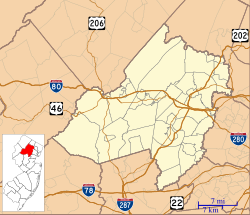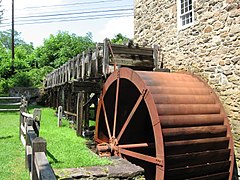
Morris Township is a township in Morris County, in the U.S. state of New Jersey. As of the 2020 United States census, the township's population was 22,974, an increase of 668 (+3.0%) from the 2010 census count of 22,306, which in turn reflected an increase of 510 (+2.3%) from the 21,796 counted in the 2000 census. The township was named for Lewis Morris, colonial governor of New Jersey.

Bale Grist Mill State Historic Park is a California state park located in Napa County between St. Helena and Calistoga. The park is the site of a water-powered grist mill that was built in 1846 is one of only two water-driven mills remaining west of the Mississippi River.

Brandywine Creek is a tributary of the Christina River in southeastern Pennsylvania and northern Delaware in the United States. The Lower Brandywine is 20.4 miles (32.8 km) long and is a designated Pennsylvania Scenic River with several tributary streams. The East Branch and West Branch of the creek originate within 2 miles (3 km) of each other on the slopes of Welsh Mountain in Honey Brook Township, Pennsylvania, about 20 miles (32 km) northwest of their confluence.

The Steuben House is a noted example of Bergen Dutch sandstone architecture, located at New Bridge Landing on the Hackensack River in River Edge, in Bergen County, New Jersey, United States.

General Nathan A. Cooper was an American landowner, businessman, and military officer from Chester Township, New Jersey.
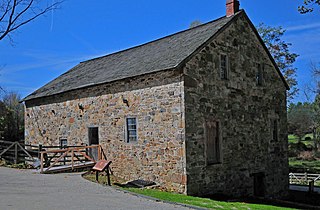
The Mill at Anselma is an archetypal small, 18th century custom grain mill in Anselma, outside Chester Springs, Pennsylvania. It is probably the only surviving one in the United States with an intact colonial-era power transmission system. A custom grain mill typically ground cornmeal and flour only for local farmers, not for commercial distribution. It was designated a National Historic Landmark in 2005.

Acorn Hall is an 1853 Victorian Italianate mansion located at 68 Morris Avenue in Morristown, Morris County, New Jersey. It was added to the National Register of Historic Places on April 3, 1973, for its significance in architecture. It serves as the headquarters of the Morris County Historical Society, which operates Acorn Hall as a historic house museum.
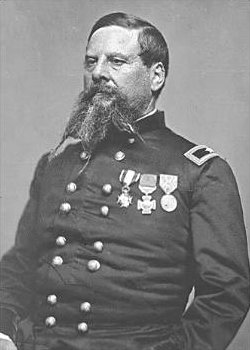
Joseph Warren Revere was a career United States Navy and Army officer. He was the grandson of American Revolutionary War figure Paul Revere.
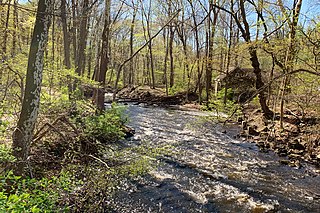
The Black River County Park is a public park in Morris County, New Jersey operated by the Morris County Park Commission.

The Newlin Mill Complex, also referred to as The Newlin Grist Mill, is a water-powered gristmill on the west branch of Chester Creek near Concordville, Pennsylvania built in 1704 by Nathaniel and Mary Newlin and operated commercially until 1941. During its three centuries of operation, the mill has been known as the Lower Mill, the Markham Mill, the Seventeen-O-Four Mill and the Concord Flour Mill. In 1958 the mill property was bought by E. Mortimer Newlin, restored and given to the Nicholas Newlin Foundation to use as a historical park. Water power is still used to grind corn meal which is sold on site. The park includes five historical buildings, which were added to the National Register of Historic Places in 1983, and 150 acres (61 ha) of natural woodland.

First Congregational Church is a historic church located at 30 Hillside Road in Chester Borough, New Jersey. The congregation was founded in 1740. The church building was added to the National Register of Historic Places on August 10, 1977, for its significance in architecture, art, and religion.
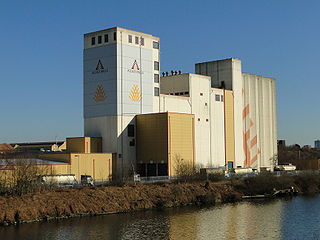
A gristmill grinds cereal grain into flour and middlings. The term can refer to either the grinding mechanism or the building that holds it. Grist is grain that has been separated from its chaff in preparation for grinding.

Thorp Mill is a historic building located in Thorp, Washington, United States.

Benson Grist Mill is a restoration-replica museum located in Tooele County, Utah in the western United States, which allows visitors to see the inner workings of a latter-nineteenth-century pioneer gristmill. It has four other historic (nineteenth-century) buildings which have been moved onto the site, as well as four ancillary structures, including an open-air pavilion. It covers 6.98 acres along State Highway 138, 0.8 mile southwest of the intersection of the Road with State Highway 36. The museum is owned and operated by a division of Tooele County.

The General Nathan Cooper Mansion is a historic house in Chester Township, Morris County, New Jersey and was the home of Nathan A. Cooper (1802–1879). It was added to the National Register of Historic Places on November 21, 1976 for its significance in architecture and military/political history.

Fosterfields, also known as Fosterfields Living Historical Farm, is a 213.4-acre (86.4 ha) farm and open-air museum at the junction of Mendham and Kahdena Roads in Morris Township, New Jersey. The oldest structure on the farm, the Ogden House, was built in 1774. Listed as the Joseph W. Revere House, Fosterfields was added to the National Register of Historic Places on September 20, 1973, for its significance in art, architecture, literature, and military history. The museum portrays farm life circa 1920.

The Morris County Park Commission (MCPC) is a board of commissioners that manages parks, facilities, and historic sites in Morris County, in the U.S. state of New Jersey.

Millville is an unincorporated community located along River Road and Shimers Brook in Montague Township of Sussex County, New Jersey. The Montague Grange and other parts of the community are in the Delaware Water Gap National Recreation Area.
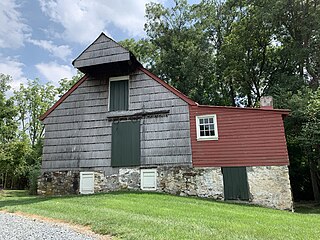
Thomas Mill and Miller's House is a historic grist mill and adjacent dwelling in West Whiteland Township, Chester County, Pennsylvania. Erected between 1744 and 1754, the buildings are made of frame and stone and formed part of the extensive Thomas family holdings in the area. The site was listed on the National Register of Historic Places on May 19, 2004.

